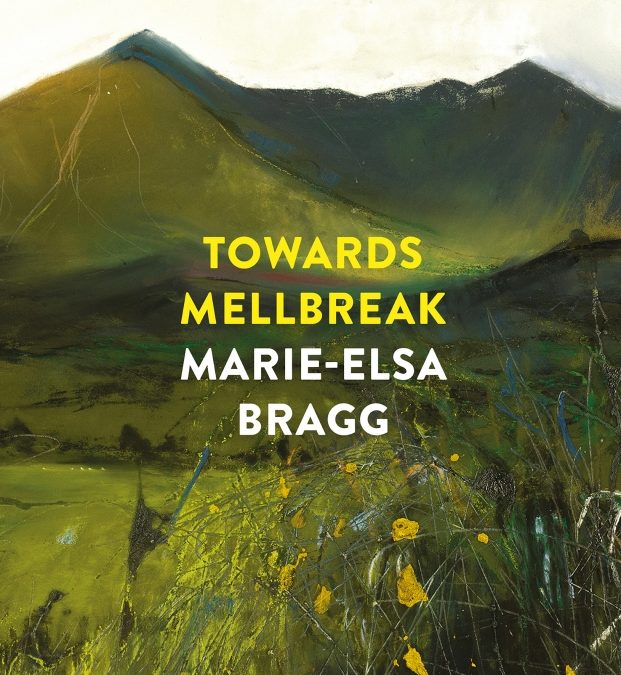Towards Mellbreak
a novel
by Marie-Elsa Bragg
–Review by Teri Hyrkas
Marie-Elsa Bragg has written a debut novel that is so splendidly textured that it may appear to the reader like a grand piece of conceptual art. The framework of the story is the multi-generational account of the Marras’ family; the setting is the area of England known as Cumbria. The narrative describes how a sheep-farming family deals with the difficult and imposing cultural changes that occurred during the mid-twentieth century in Cumbria. With that seemingly straight forward plot line, Towards Mellbreak could have been an ordinary family chronicle, but Bragg’s storytelling is so vivid and richly expressive that her tale creates an unparalleled reading experience.
Bragg, an ordained Priest in the Church of England, is familiar with Cumbria through time spent there with her father’s family, and it is to them that she has dedicated Towards Mellbreak (Penguin Random House UK, 2017). The book is an homage to the generations of people who have lived on this rugged and isolated landscape of Northwest England; it is also a prose-poem to the land, its fells, lakes and rivers, flora, fauna and truculent weather.
In Towards Mellbreak, Bragg tells of the fictional Marras family of Ard Crags who grazed sheep on the hills and moorlands of Cumbria for generations, but she also uses her book as a vehicle to relate of the real-life changes that came upon sheep farmers in Cumbria in the 1960’s and 1970’s. During that time, the UK introduced numerous livestock regulations which overburdened some farming families and left them struggling to survive. This slice of recent Cumbrian history provides the setting for much of the tension in the story. The author keeps the reader’s interest moving toward the future with a marriage and birth of a baby in the Marras family, and descriptions of Cumbrian farming rituals and traditions in the local church also help to project an aura of stability, but Bragg retains an ominous underlying soundtrack, a continuo of strain in the narrative as central character Harold Marras tries to cope with costly and unavoidable changes on the farm.
Bragg also presents the character of Catherine, grandmother to Harold, as a representative of the traditional, steadfast ways of Cumbria. Catherine’s brother, John, a beloved pillar of the family who is deceased, became a Wesleyan missionary to China after WWI. The letters that John sent from China are preserved by Catherine as treasures, and their reading marks special occasions in the family. Upon the birth of Harold’s son, Stephen John, Catherine — now a great-grandmother with the arrival of this child — makes a gift of one of her late brother’s letters to Harold:
Central China
Longtan Medical Centre
11th November, 1927
“Dear Catherine, …Your news has taken a few months to reach us here and brings joy in hard times. The thought of our young George John starting his life carrying the name which I, our father and grandfather have had the honor to live with in these troublesome and happy lives of ours, will keep me going in the long days. They say the soul lives in the middle of us, and so I pray the name John will bless him and bind the faith and strength of John the Baptist into him. May he cry, ‘Make straight the way of the Lord,’ forever reminded to keep Christ in the very centre of him. And I, as his proud uncle, will keep him in the centre of my prayers. We are a chain, Catherine. A blessed one from the first Adam to the last, held together by voice, name, by actions and of course infused with the grace that cleaves to our souls and joins our faith. I give thanks for the new link of our little George John. One more generation in the line of Christ, and a beloved one at that.”
Change is a major component in Towards Mellbreak; change in agricultural methods, in religious practices, in family life. In an article she wrote for “The Tablet,” called “My Cumbrian Galilee: A Novelist’s Reimagining of Gospel Scenes,” which appeared online in April of this year, Bragg stated: “One of the elements of the story is the shifting place of Christianity in the lives of one family across four generations….Each character in the story, each generation, lives with the question of how beautiful traditions can be preserved in the face of dramatic change. For each individual, part of the answer lies in whether daily ritual allows for a richer engagement with life.”
Towards Mellbreak is an astounding book, filled with lyrical renderings of the harsh, majestic Cumbrian terrain. I believe the over-arching themes of the novel are the unrelenting, even tragic, nature of change and the power of memory. Towards Mellbreak is also a book that is filled with Christian imagery, particularly Holy Week imagery, if one has a mind to look for it. From the mountains, to the juniper tree, the sheep and shepherd, and white cloth strips hung on a nail in homes, Bragg inserts numerous representations of Christ’s passion and death. Particularly stunning is the conclusion of the book which contains the most moving, gritty, breathtaking resurrection depiction I have ever read.
I anticipate that this book will be short-listed for several UK awards: The National Book Award, Man-Booker Prize, and Orange Prize, to name a few. A marvelous volume to take up as Eastertide opens into Pentecost, I hope you will read and relish Towards Mellbreak by Marie-Elsa Bragg.

